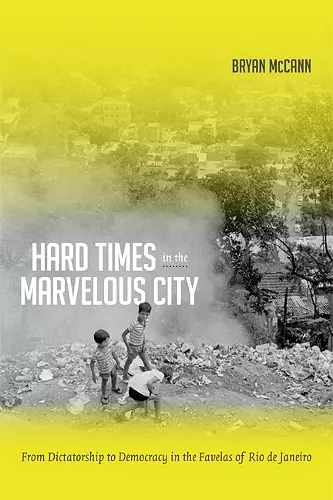Hard Times in the Marvelous City
From Dictatorship to Democracy in the Favelas of Rio de Janeiro
Format:Hardback
Publisher:Duke University Press
Published:17th Jan '14
Currently unavailable, and unfortunately no date known when it will be back

This history explains how and why the favelas of Rio de Janeiro were able to resist demolition in the 1970s but succumbed to the drug wars of the 1980s and 1990s.
Beginning in the late 1970s, activists from the favelas of Rio de Janeiro challenged the conditions—such as limited access to security, sanitation, public education, and formal employment—that separated favela residents from Rio's other citizens. The activists built a movement that helped to push the nation toward redemocratization. They joined with political allies in an effort to institute an ambitious slate of municipal reforms. Those measures ultimately fell short of aspirations, and soon the reformers were struggling to hold together a fraying coalition. Rio was bankrupted by natural disasters and hyperinflation and ravaged by drug wars. Well-armed drug traffickers had become the new lords of the favelas, protecting their turf through violence and patronage. By the early 1990s, the promise of the favela residents' mobilization of the late 1970s and early 1980s seemed out of reach. Yet the aspirations that fueled that mobilization have endured, and its legacy continues to shape favela politics in Rio de Janeiro.
"Hard Times in the Marvelous City will be essential reading for anyone interested in Brazil's redemocratization, grassroots political mobilization and the challenges of governance, and the policing and violence that have intersected in the recent history of Rio de Janeiro's favelas and their city."—Jerry Dávila, author of Hotel Trópico: Brazil and the Challenge of African Decolonization, 1950–1980
"McCann’s argument for optimism in the contemporary moment relies on a historical comparison: the political conditions for favela integration are much better now than they were in the period of Brazil’s transition to democracy, as the political and economic environment is more stable. Displaying his faith in building the city from below, he declares that community organizers and mobilizers 'have seized a new opportunity to build a Rio de Janeiro that lives up to its democratic promise and to its nickname: the Marvelous City.'" -- Tom Winterbottom * Public Books *
"Bryan McCann has given us a compelling political history of Brazil in the 1970s and 1980s through the lens of Rio de Janeiro. His research is so meticulous and his writing so fluid that you feel as though you are living through the unfolding drama of politics, personalities, social forces, and serendipity. We see the way these forces re-create and perpetuate the deep divide between favelas and the rest of the city, despite people's movements and struggles for social justice."—Janice Perlman, author of Favela: Four Decades of Living on the Edge in Rio de Janeiro
“This specialized work is well done and has broad implications for Brazilian political development. Recommended. Upper-division undergraduate, graduate, and research collections.”
-- J. A. Rhodes * Choice *“One of McCann’s clear strengths lies in his consistent attention to, as previously noted, multiple actors and their interactions…. McCann’s intimate knowledge of specific favelas and their inhabitants blends well with his accounts of higher-level political events. These two volumes are substantial, provocative, and useful additions to the literature.” -- Henry Dietz * Latin American Politics and Society *
“[T]he book is a must read for students and scholars who wish to gain an insightful historical description of Rio’s favelas and their place in the city as well as a contextualization of current issues regarding these relations.” -- Marie Kolling * Brasiliana *
"McCann’s analysis is insightful, and his research brings exciting new perspectives to contemporary Rio de Janeiro’s urban history and, more generally, the history of Brazil, Latin America, the Global South, and urbanity." -- Peter Beattie * Journal of Interdisciplinary History *
"McCann should be congratulated for providing readers with a neatly constructed account of popular politics and sociopolitical change in one of the world's great cities." -- James Woodard * American Historical Review *
“By offering readers a comprehensive overview of this period, McCann’s book makes a significant contribution to our understanding of Rio de Janeiro today and the dilemmas that the Marvelous City still faces after all these years.” -- Michel Misse * American Journal of Sociology *
ISBN: 9780822355236
Dimensions: unknown
Weight: 476g
256 pages